De Duitse literatuurwetenschapper, schrijver, criticus, jurist en socioloog Hans Mayer werd geboren op 19 maart 1907 in Keulen. Zie ook alle tags voor Hans Mayer op dit blog.
Uit: Du störst mich nicht (Über Thomas und Heinrich Mann: Briefwechsel 1900-1949)
„Thomas dagegen schreibt am 31. Juli, auch aus Kalifornien und nachKalifornien: „Wir haben große Personalnot, unsere Dunklen verlassen uns und neue sind teils unerschwinglich, teils unerträglich. Aber einmal werden wir ja wieder in Ordnung kommen und hoffen, dann Nelly und Dich recht bald einen Abend bei uns zu haben.“ Dieser Briefwechsel macht es Verehrern Thomas Manns nicht leicht.
Da ist noch mehr. Für den biographischen und auch literarischen Hintergrund des Frühwerks von Thomas Mann nämlich sind seine Briefe an Heinrich von einzigartiger Bedeutung.
Den ersten der erhaltenen Briefe schreibt der 25jährige Thomas Mann nach Abschluß von „Buddenbrooks“; das Manuskript liegt nun beim Verleger Samuel Fischer, aber noch hat der Autor über sein Werk „nichts Neues“ gehört; gleichzeitig gratuliert er ein bißchen säuerlich zur Verleger-Reklame für Heinrichs Roman „Im Schlaraf-fehlend“. Man lebt in einem Zeitalter der Migränen, ästhetischen Ressentimente und Nervenkrisrm, und der junge Thomas Mann, arg auf Modernität erpicht, läßt es sich gesagt sein. Leidenschaften werden .durchlitten‚ genossen und literarisch filtriert, was Schmerzhaftes nicht ausschließt.
Als .‚Buddenbrooks“ endlich angenommen ist, teilt der Verfasser dem älteren Bruder etwas ironisch mit: „Ich werde mich photographieren lassen, die Rechte in der Frackweste und die Linke auf die drei Bände gestützt; dann kann ich eigentlich getrost in die Grube fahren.“ Im selben Brief aber (13. Februar 1901} hieß es Vorher: „Depressionen wirklich arger Art mit vollkommen ernst gemeinten Selbstabschaffungsplänen haben mit einem unbeschreiblichen, reinen und unverhoftten Herzensglück gewechselt‚ mit Erlebnissen, die sich nicht erzählen lassen, und deren Andeutung natürlich wie Renommage wirkt.“ Es ist schwer, hier vom Bericht. über ein .,ernstes Leben“ zu sprechen.“
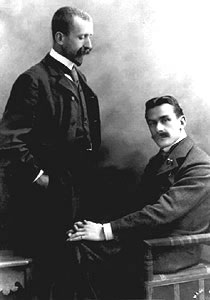
Hans Mayer (19 maart 1907 – 19 mei 2001)
Heinrich en Thomas Mann rond 1902
De Amerikaanse schrijver Philip Roth werd geboren op 19 maart 1933 in Newark. Zie ook alle tags voor Philip Roth op dit blog.
Uit: Nemesis
“What people did know was that the disease was highly contagious and might be passed to the healthy by mere physical proximity to those already infected. For this reason, as the number of cases steadily mounted in the city — and communal fear with it — many children in our neighborhood found themselves prohibited by their parents from using the big public pool at Olympic Park in nearby Irvington, forbidden to go to the local “air-cooled” movie theaters, and forbidden to take the bus downtown or to travel Down Neck to Wilson Avenue to see our minor league team, the Newark Bears, play baseball at Ruppert Stadium. We were warned not to use public toilets or public drinking fountains or to swig a drink out of someone else’s soda-pop bottle or to get a chill or to play with strangers or to borrow books from the public library or to talk on a public pay phone or to buy food from a street vendor or to eat until we had cleaned our hands thoroughly with soap and water. We were to wash all fruit and vegetables before we ate them, and we were to keep our distance from anyone who looked sick or complained of any of polio’s telltale symptoms.
Escaping the city’s heat entirely and being sent off to a summer camp in the mountains or the countryside was considered a child’s best protection against catching polio. So too was spending the summer some sixty miles away at the Jersey Shore. A family who could afford it rented a bedroom with kitchen privileges in a rooming house in Bradley Beach, a strip of sand, boardwalk, and cottages a mile long that had already been popular for several decades among North Jersey Jews. There the mother and the children would go to the beach to breathe in the fresh, fortifying ocean air all week long and be joined on weekends and vacations by the father. Of course, cases of polio were known to crop up in summer camps as they did in the shore’s seaside towns, but because they were nothing like as numerous as those reported back in Newark, it was widely believed that, whereas city surroundings, with their unclean pavements and stagnant air, facilitated contagion, settling within sight or sound of the sea or off in the country or up in the mountains afforded as good a guarantee as there was of evading the disease.“
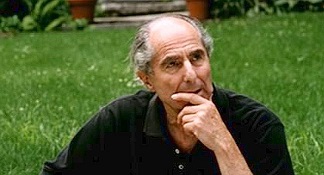
Philip Roth (Newark, 19 maart 1933)
De Nederlandse schrijver Mano Bouzamour werd geboren op 19 maart 1991 in Amsterdam. Zie ook alle tags voor Mano Bouzamour op dit blog.
Uit: De belofte van Pisa
“Ik hurkte neer en strikte mijn veters, toen het me opviel dat er al geruime tijd geen verkeer meer over de weg suisde, als een afvoer die verstopt zat een geen water door liet stromen. (…) Voordat tot me doordrong wat ik zag, ontvouwde zich een onwerkelijk schouwspel. Het werd aangekondigd door zwaar accelererende geluiden, als het gegrom van leeuwen, die uit omliggende straten kwamen en steeds luider werden. Mensen op terrasjes en bij het ijstentje keken verbaasd op om vast te stellen wat er gaande was. Donkerkleurige sportauto’s vlogen uit alle denkbare richtingen over de weg, met gierende banden die grip op het asfalt probeerden te houden maar doorschoten, als de remmende klauwen van een snellende kat op een houten vloer. Ze stopten voor ons in een ondoordringbare verweerlinie. Mannen sprongen uit de sportauto’s, als slierten strijdbare soldaatmieren. Ze brachten een symfonie ten gehore van openslaande autodeuren, rappe voetstappen en ladende machinegeweren.’
(…)
“‘Wat kijk je?!’ ‘Mag ik niet kijken?’
‘Kijk weg voordat ik je ga beuken, blonde bitch.’
‘Mij beuken? Kom dan als je lef hebt, kut-Marokkaantje.’
We stapten van de Vespa’s en veinsden een vuistgevecht. Automobilisten stapten uit en voetgangers snelden schreeuwend op ons af.
En dan lachten we ze ineens uit.
En gaven elkaar een high five.
De gezichten van die lui.
Ze begrepen het niet.
Sommigen lachten.
Anderen niet.
Sukkels.”

Mano Bouzamour (Amsterdam, 19 maart 1991)
De Duitse schrijfster Kirsten Boie werd geboren op 19 maart 1950 in Hamburg. Zie ook alle tags voor Kirsten Boie op dit blog.
Uit: Bestimmt wird alles gut
„Dies ist die wahre Geschichte von Rahaf, die ist jetzt zehn Jahre alt. Und von ihrem Bruder Hassan, der ist jetzt neun.
Rahaf und Hassan wohnen mit Mama und Papa in einem kleinen deutschen Ort. Und natürlich wohnen auch ihre beiden kleinen Schwestern da, Amal und Haia. Die sind aber erst drei und vier. Mit Amal und Haia kann man nicht gut spielen.
Früher haben Rahaf und Hassan in einer anderen Stadt gewohnt. Die Stadt heißt Homs und liegt in einem anderen Land. Das Land heißt Syrien.
In Homs fanden Rahaf und Hassan es schön. Sie haben in einem großen Haus gewohnt, mit vier Stockwerken. Ganz unten haben Oma und Opa gewohnt. Im ersten Stock haben Onkel Ahmed und Tante Jinin gewohnt, mit ihren fünf Kindern. Im zweiten Stock haben Onkel Ziad und Tante Marwa gewohnt, die hatten drei Kinder. Da hatten Rahaf und Hassan acht Cousins und Cousinen, das war gut zum Spielen. Rahaf und Hassan haben mit Mama und Papa und Amal und Haia ganz oben im Haus gewohnt, im dritten Stock.
Rahaf hat am liebsten mit ihrer Cousine Aycha gespielt. Aycha war genauso alt wie Rahaf. Darum sind sie sogar zusammen in die Schule gegangen, in dieselbe Klasse. Manchmal haben Rahaf und Aycha mit ihren Puppen gespielt.“
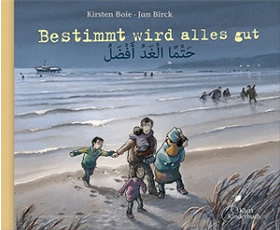
Kirsten Boie (Hamburg, 19 maart 1950)
Cover
De Amerikaanse schrijfster Lynne Sharon Schwartz werd geboren op 19 maart 1939 in New York. Zie ook alle tags voor Lynne Sharon Schwartz op dit blog.
Uit: Leaving Brooklyn
“He looked at me in startled, confused pleasure, as if I had cunningly put my finger on one of the profound and inexplicable contradictions at the heart of things, as if I had asked why is there suffering in the world or why do men constantly make war if they say they want peace. He tousled my hair and had no answer, which surprised me because he usually did.
I minded the mystery of the eye more than the eye itself. I craved an exotic story to tell, a label by which I might be known. At school there was Carlotta Kaplowitz, famed for her dark beauty and wondrous name – one of the few girls not named Barbara or Susan or Carol or Judy – who contracted polio. When she returned months later on crutches, scattering true medical tales like favors, she was lionized in the playground. Polio was dramatic, though Carlotta’s case, like Hans Castorp’s tuberculosis, was mild – she would walk again. Another girl, one of the Carols, stayed home for a whole term with an unnamed ailment. I brought her the class assignments. How enviously I breathed the musty, invalid air of the shaded room where she sat propped up on pillows, her every need attended to by her scurrying mother, like a Victorian heroine enervated by vocation, like Elizabeth Barrett before she met Browning.
The iris of my right eye was smaller than that of the left. And at the top of the sphere, the part you couldn’t see unless the lid was raised, was a milky, blurry patch, a scar. It was as if someone had painted an eye and smudged the upper rim, giving it an unfinished look, then was called away from the easel – an emergency, a long trip – and never came back.
The smudging was not all. Because of a weak muscle, the iris, of its own volition and at unpredictable times, would drift from its resting place to float – I almost wrote “flee” – beneath the upper lid for a few seconds, leaving blank white space. A wandering eye, it is aptly called. Restless, bored with the banality of what is presented, it escapes to the private darkness beneath the lid, with the wild dancing colors. Soon it drifts back and attends to its duties, not being totally irresponsible. Much of the time no one would know about its little trip, just as no one knows about the secret journeys or aberrations of anyone else.”

Lynne Sharon Schwartz (New York, 19 maart 1939)
Brooklyn, New York
De Oekraïense schrijfster en dichteres Lina Kostenko werd op 19 maart 1930 geboren in Rzhyshchiv. Zie ook alle tags voor Lina Kostenko op dit blog.
Destin
J’ai rêvé une nuit d’un étrange bazar
En plein air, en plaine campagne
On vendait des destins de toutes sortes
Pour des généreux, pour des avares
Et pour des clients de toutes sortes.
Il y en avait pour pas moins que des fils de roi
D’autres n’étaient faits que pour des pauvres mignons
On pouvait acheter un destin à un sou
D’autres en achetaient qui valaient des millions.
Certains payaient avec leur chance
D’autres payaient de leur conscience
Certains payaient de tout leur or
Et d’autres s’embarrassaient fort.
Les diseuses de bonne aventure comme des cartes
Tassaient les jours et se massaient près des clients
Les destins eux-mêmes pour moi s’assemblaient
Et parmi eux un seul se détourna.
Je regardai celui-là dans son visage clair
Et du fond de moi-même j’appelai son regard
— Qu’importe, me dit-il, tu ne me prendras pas
Mais de le dire, lui faisait mal au cœur.
— Je te prendrai peut-être
— Non, tu sais bien
Dit-il d’un ton sévère
Pour moi il faudrait que tu donnes ta vie
Et moi en échange t’apporterais le chagrin.
— Mais alors, qui es-tu ?
Et ton nom quel est-il ?
Pour être digne de me coûter si cher ?
— Poésie est ma sœur
Et l’humaine vérité notre mère.
Je l’ai reçu et j’en ai fait ma loi.
Alors, grande merveille se fit :
La nuit passa, le songe finit
Mais le destin est resté avec moi.
J’ai un destin que j’ai choisi moi-même
Et qu’il m’arrive n’importe quoi
De rien ne demanderai compte
A mon destin, c’est moi qui l’ai choisi.
Vertaald door Marie-France Jacamon
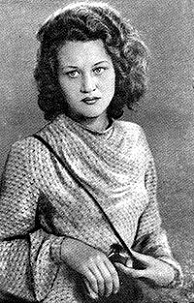
Lina Kostenko (Rzhyshchiv, 19 maart 1930)
De Kroatische dichter en schrijver Petar Preradović werd geboren op 19 maart 1818 in het dorp Grabrovnica bij Virovitica. Zie ook alle tags voor Petar Preradović op dit blog.
Traveller (Putnik, fragment)
Where am I? Where have I come?
Trapped by night in this foreign land.
I don’t know what track to follow,
On naked rocks I just wallow,
Weary legs in this wilderness!”
What other shelter can I find?
The North wind blows on snowy peaks
While this poor wayfaring stranger
Finds in darkness darkest danger
As this cold earth with hardness speaks.”
All around the fog has fallen,
And well concealed now is the moon
Star tracks have disappeared and yes,
Mother dearest,
Take under your roof a foreign son!”
She said:“I’d take you in with pleasure,
But look; see how they are sleeping –
Three sons three daughters, a full house,
Which fills this mothers heart of course
To the brim – it’s overflowing.”
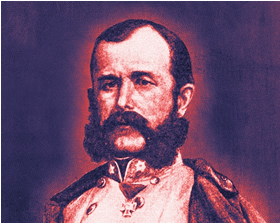
Petar Preradović (19 maart 1818 – 18 augustus 1872)
Zie voor nog meer schrijvers van de 19e maart ook mijn vorige blog van vandaag.
